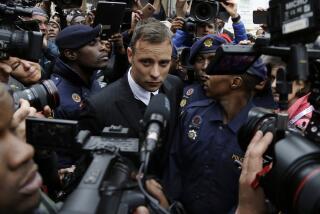Zwelakhe Sisulu Goes Home but Must Adhere to Severe Restrictions : S. Africa Frees Anti-Apartheid Editor Detained in ’86
- Share via
JOHANNESBURG, South Africa — Newspaper editor Zwelakhe Sisulu was freed Friday after two years in detention without trial, but the government immediately placed grinding restrictions on the prominent anti-apartheid activist.
“He’s back. He’s with us again now,” Zodwa Sisulu said as her husband hugged his 8-year-old son and 5-year-old daughter at their home in Soweto, the sprawling black township on the edge of Johannesburg, where he was arrested by security police 720 days ago.
Sisulu, the 37-year-old editor of the weekly New Nation, seemed thin but in good spirits.
Civil rights groups saw the release of Sisulu--and of three other men also detained under the 30-month-old state of emergency--as the latest moves in a new government campaign designed to improve Pretoria’s image abroad.
“He still can’t believe it,” his wife said. Although the family is “beyond ourselves with excitement,” she added, the conditions of his release “mean things won’t be the same here. In effect, we’re all restricted with him.”
Sisulu’s restriction order is among the most severe placed on more than 400 detainees freed in recent months. It prohibits him from any political or journalistic activities, meaning he cannot return to his newspaper job. He is prevented from talking to reporters as well.
The editor also must remain home from 6 p.m. to 6 a.m. and report twice daily to the police. He cannot leave the Johannesburg area without police permission and may not see more than 10 people at a time.
“He’s effectively imprisoned in his own house,” Sisulu’s attorney, Priscilla Jana, said at a news conference. Sisulu was present at the conference, but the attorney asked reporters not to approach him.
Sisulu comes from a family of prominent anti-apartheid campaigners. His father, Walter Sisulu, is serving a life sentence with African National Congress leader Nelson R. Mandela. His mother, Albertina, 70, helped found the 2-million-member United Democratic Front and currently lives under a government restriction order that prevents her from any political activity and confines her to home at night.
The Sisulu family is to be awarded the $100,000 Carter-Menil Human Rights prize from former U.S. President Jimmy Carter next week, but no members of the family have been granted permission by the government to travel to the United States.
Sisulu, who received a prestigious Nieman Fellowship for journalists at Harvard in 1984, has been detained several times in the past decade. Soon after he returned from Harvard in 1985, he became founding editor of the New Nation, a weekly newspaper published by the Roman Catholic Bishops’ Conference.
Also released Friday, under similar restrictions, was Eric Molobi, national coordinator of the National Education Crisis Committee, who had been in detention for a year.
The government gave no reason for the releases. But they appeared to be part of a trend that began earlier this year when South Africa indicated its willingness to exchange peace in Angola for independence in Namibia, the territory it has ruled for 70 years.
In recent weeks, the government granted clemency to the Sharpeville Six, sentenced to hang for a township mob killing, and freed terminally ill activists Harry Gwala, of the outlawed African National Congress, and Zeph Mothopeng, of the outlawed Pan Africanist Congress.
The justice minister also announced last week that Mandela, 70, who has served 24 years of a life sentence, will be allowed to live outside of prison with more family visits when he has recovered from tuberculosis at a Cape Town hospital. The move could be the beginning of a phased release for the man revered by millions of South African blacks.
“This is all part of an international public relations exercise,” Max Coleman, a human rights activist here, said Friday night. “The government realizes it has to do something to bring in outside capital to help solve its domestic economic difficulties.”
More to Read
Sign up for Essential California
The most important California stories and recommendations in your inbox every morning.
You may occasionally receive promotional content from the Los Angeles Times.













